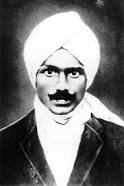Chinnaswami Subramania Bharathi also known as Bharathiyar (11 December 1882 – 11 September 1921), was a Tamil writer, poet, journalist, Indian independence activist , a social reformer and a polyglot. Popularly known as "Mahakavi Bharathi" ("Great Poet Bharathi"), he was a pioneer of modern Tamil poetry and is considered one of the greatest Tamil literary figures of all time. His numerous works included fiery songs kindling patriotism during the Indian Independence movement.
Bharati is considered as one of the pioneers of modern Tamil literature.[10] Bharati used simple words and rhythms, unlike his previous century works in Tamil, which had complex vocabulary. He also employed novel ideas and techniques in his devotional poems. He used a metre called Nondi Chindu in most of his works, which was earlier used by Gopalakrisnha Bharathiar.
Bharati's poetry expressed a progressive, reformist ideal. His imagery and the vigour of his verse were a forerunner to modern Tamil poetry in different aspects. He was the forerunner of a forceful kind of poetry that combined classical and contemporary elements. He had a prodigious output penning thousands of verses on diverse topics like Indian Nationalism, love songs, children's songs, songs of nature, glory of the Tamil language, and odes to prominent freedom fighters of India like Tilak, Gandhi and Lajpat Rai. He even penned an ode to New Russia and Belgium. His poetry not only includes works on Hindu deities like Shakti, Kali, Vinayagar, Murugan, Sivan, Kannan(Krishna), but also on other religious gods like Allah and Jesus. His insightful similes have been read by millions of Tamil readers. He was well-versed in various languages and translated speeches of Indian National reform leaders like Aurobindo, Bal Gangadhar Tilak and Swami Vivekananda.
He describes the dance of Shakthi (in Oozhi koothu, Dance of destiny) in the following lines:
Tamil
சக்திப் பேய் தான் தலையொடு தலைகள் முட்டிச்
சட்டச் சட சட சடவென்றுடைபடு தாளம் கொட்டி அங்கே
எத்திகினிலும் நின்விழி அனல் போய் எட்டித்
தானே எரியும் கோலம் கண்டே சாகும் காலம்
அன்னை அன்னை
ஆடுங்கூத்தை நாடச் செய்தாய் என்னை
It is the opinion of some litterateurs that Bharathiar's Panchali Sapatham, based on the story of Panchali (Draupadi), is also an ode to Bharat Mata. That the Pandavass are the Indians, the Kauravas the British and the Kurukshetra war of Mahabharat that of the Indian freedom struggle. It certainly is ascribed to the rise of womanhood in society.
Tamil
பட்டினில் உடையும் பஞ்சினில் ஆடையும்
பண்ணி மலைகளென வீதி குவிப்போம்
கட்டித் திரவியங்கள் கொண்டு வருவார்
காசினி வணிகருக்கு அவை கொடுப்போம்
[English Translation]
We make Dresses from Silk and Cotton
In quantities as large as mountains
They bring lot of wealth
The traders around the world,
to whom we give it(dresses)
He is known to have said, "Even if Indians are divided, they are children of one Mother, where is the need for foreigners to interfere?" In the period 1910–1920, he wrote about a new and free India where there are no castes. He talks of building up India's defense, her ships sailing the high seas, success in manufacturing and universal education. He calls for sharing amongst states with wonderful imagery like the diversion of excess water of the Bengal delta to needy regions and a bridge to Sri Lanka.
Bharati also wanted to abolish starvation. He sang, "Thani oru manithanakku unavu illayenil intha jagaththinai azhithiduvom" translated as " If one single man suffers from starvation, we will destroy the entire world".
